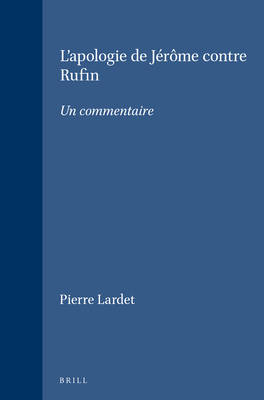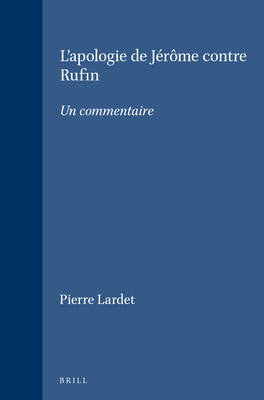
- Afhalen na 1 uur in een winkel met voorraad
- Gratis thuislevering in België vanaf € 30
- Ruim aanbod met 7 miljoen producten
- Afhalen na 1 uur in een winkel met voorraad
- Gratis thuislevering in België vanaf € 30
- Ruim aanbod met 7 miljoen producten
Zoeken
Omschrijving
In the three books of his Contra Rufinum, a work dating back to his mature period (401-402), Jerome (ca 347-420) fought against his erstwhile friend turned rival, Rufinus: the two Latin monks, one settled in Bethlehem, the other in Jerusalem, had come to confront each other on such issues as the timeliness and ways (translation, commentary...) of transmitting an Oriental heritage to the West, Greek (in particular the works of Origen [ca. 185-ca. 253], whose Peri Archôn they both translated in competition) as well as Jewish (the biblical hebraica veritas which Jerome championed). They were also at variance on the appreciation of profane culture (the Latin classics). Jerome's Contra Rufinum is a masterpiece by a brilliant polemist and an important document as to a knowledge of the actors and the vicissitudes of a controversy which mobilised many Christians, Eastern and Western alike, on the eve of the sacking of Rome by the Barbarians.
This commentary seeks to analyse the treatise in all its facets (historical and theological, philological and rhetorical), and to elucidate its connections with the different traditions (classical, biblical, patristic) to which it belongs. The Contra Rufinum thus turns out to be a remarkable vantage point from which to illuminate the entire corpus of an author whose work, spread over nearly half a century, was immensely influential during the Middle Ages and the Renaissance.
This commentary seeks to analyse the treatise in all its facets (historical and theological, philological and rhetorical), and to elucidate its connections with the different traditions (classical, biblical, patristic) to which it belongs. The Contra Rufinum thus turns out to be a remarkable vantage point from which to illuminate the entire corpus of an author whose work, spread over nearly half a century, was immensely influential during the Middle Ages and the Renaissance.
Specificaties
Betrokkenen
- Auteur(s):
- Uitgeverij:
Inhoud
- Aantal bladzijden:
- 600
- Taal:
- Frans
- Reeks:
- Reeksnummer:
- nr. 15
Eigenschappen
- Productcode (EAN):
- 9789004094574
- Verschijningsdatum:
- 1/05/1993
- Uitvoering:
- Hardcover
- Formaat:
- Genaaid
- Afmetingen:
- 155 mm x 235 mm
- Gewicht:
- 1007 g

Alleen bij Standaard Boekhandel
+ 1349 punten op je klantenkaart van Standaard Boekhandel
Beoordelingen
We publiceren alleen reviews die voldoen aan de voorwaarden voor reviews. Bekijk onze voorwaarden voor reviews.








